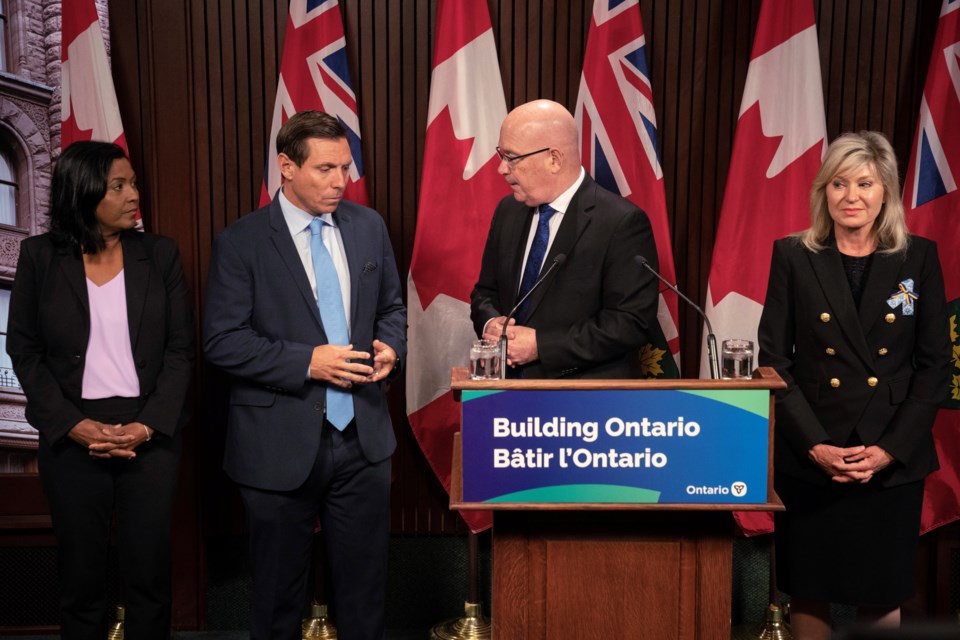The Ford government's latest major U-turn is cancelling the planned dissolution of Peel Region, Housing and Municipal Affairs Minister Paul Calandra announced on Wednesday.
In May, the Tories introduced a bill to split Peel Region by Jan. 1, 2025, and have Brampton, Mississauga and Caledon stand alone as single-tier municipalities.
Former Mississauga mayor Hazel McCallion and current Mayor Bonnie Crombie had long advocated for the split, arguing their city had subsidized Brampton's and Caledon's growth. The PCs went so far as to name the dissolution bill after McCallion, who passed away a few months before it was introduced.
At the time, then-housing minister Steve Clark said the government was taking "decisive action" to build more homes.
The Hazel McCallion Act created a transition board that worked over the past six months to iron how out the split would work on the ground. The panel was supposed to give recommendations to the Ford government about the slew of issues that had to be sorted out — like the future of municipal taxes, finances, regional staff, conservation authorities and the Peel Region Police — by 2025.
The board will stay in place but is getting new marching orders. Instead of being a bureaucratic divorce lawyer, it'll act more like a marriage counsellor.
The new mandate "asks the board to bring forward recommendations on optimizing the delivery of services that support the commitment to build more homes, including land-use planning, servicing, roads and waste management," according to a news release.
"While we originally thought that the best way to achieve our goals of better services and lower taxes was through dissolution, we’ve since heard loud and clear from municipal leaders and stakeholders that full dissolution would lead to significant tax hikes and disruption to critical services the people of Peel Region depend on," Calandra said. "This is something our government will never support."
Calandra was asked to provide any internal evidence to back up his assertions but dodged the question. A Deloitte study conducted by Peel Region suggested the dissolution would lead to double-digit tax increases in Mississauga and Brampton and a triple-digit increase in Caledon. Brampton Mayor Patrick Brown said the split would cost his city $1.3 billion.
The Deloitte report was an updated version of a 2019 report commissioned to support Peel's ongoing existence and wouldn't have analyzed any benefits of separation, Crombie countered.
The transition board's work allowed the government to "really dig into" unanswered questions about costs and services, Calandra said, but he didn't explain why that work wasn't done ahead of time or why the board couldn't have been named without moving forward on the dissolution.
Calandra was also asked whether the initial bill was introduced to entice Crombie to stay on as Mississauga mayor and not jump into the Liberal leadership race — which she won earlier this month — and if the reversal was motivated by a desire to create some political headache for the new Liberal leader early in her tenure.
He didn't bite but did take veiled shots at her in the press release and during the press conference.
"While some might be okay with raising taxes on hard-working people, families, and businesses, we aren’t," the news release said.
Crombie doubled down on her wish for dissolution at a press conference later in the day.
"This isn't the end of our path to independence. It's simply a bump in the road," she said.
"I want to acknowledge the premier and minister could have chosen to completely walk away from the solution today, but they chose not to because I know they share our collective commitment to ensuring that local government runs efficiently and effectively and that our taxpayers get a fair deal," she said.
By having the transition board continue in a more limited role, Crombie is confident its work will show Mississauga should stand alone.
Brampton Councillor Gurpartap Singh Toor said he and his colleagues are relieved the province chose not to proceed.
Drafting the regional budget has been "tense," he said, because the region is "bleeding through every corner. They're bleeding staff every single day because staff doesn't have a guarantee they're going to have a job."




